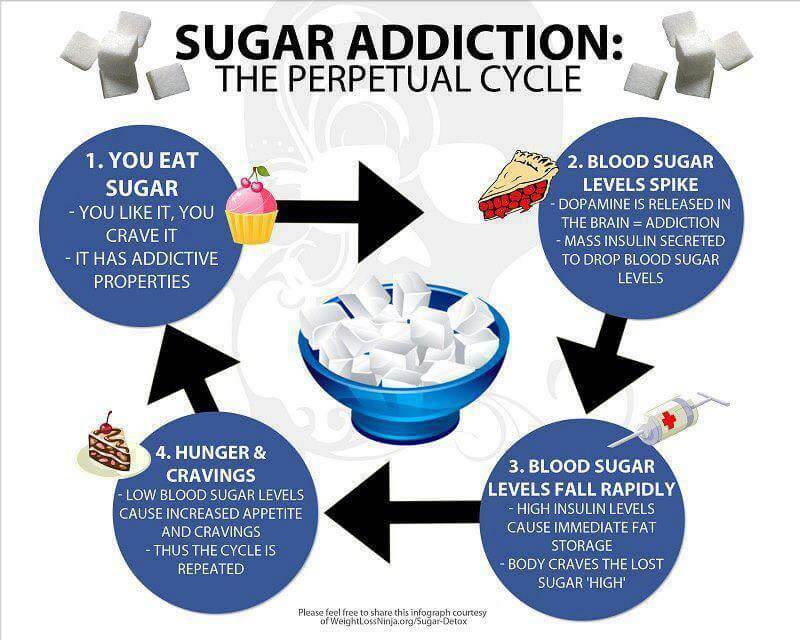It’s 2018! The New Year.. and it’s time to get serious about your fitness!
On some social media platforms, I have had some friends sharing a 21 day “No Sugar” diet. While I am all for cutting the refined sugar in cakes, candy, snacks and alcohol — cutting all sugar from your diet for 21 days is a truly difficult task.. And one that may not be as helpful as those individuals think.
First, not all sugar is terrible for you — it’s the ADDED sugar in food that creates the nutritional issues.
According to the American Heart Association, Americans eat an extra 355 calories a day from sugar. That’s 37 pounds of sugar ingested over the course of a year.
The American Heart Association recommends that a woman ingests no more than 100 calories a day of sugars (roughly 6 teaspoons) and a man 150 calories a day (9 teaspoons). Amounts that seem relatively in check with what would logically seem an average person would ingest. Except that, according to the above mentioned research — the average American has 22.2 teaspoons of sugar a day! And these aren’t just overweight people living off or cake and cookies — it includes the people that have chosen to eat healthy. Quite honestly, the levels of sugar intake in many foods can be maddeningly surprising.
Personally, let me say that I’m not a “sweets” guy. Not only do I not eat them, I really don’t even like them. So, naturally, I just assumed that my eating habits were of the low sugar variety. But in consciously studying my macro nutritional ingestion — I was surprised to realize just how many of my food choices were shockingly high in sugars.
What has sugar besides the common sense foods? How about potatoes, bagels, protein bars, sauces, condiments, salad dressings, or even plain Greek yogurt. And of course fruit. All of these foods add sugar into your diet, and can sabotage even the best laid eating plan.
That said, instead of going 21 days with a recipe for failure “no sugar diet” — this program I have devised will instead allow you to complete four weeks in which you can remove most added sugar from you diet.
The idea is not necessarily to live a life without sugar forever, but to become conscious of sugar, the foods that contain sugars, and how it affects our bodies. Eat right, follow the program, and work within a fitness/workout program and You WILL lose weight. You WILL feel amazing. And You WILL become more defined. But… My true goal in this program below is to develop in you a lifelong understanding of how food choices truly affect fitness goals.
The keys to success are to:
1) Do your research. Ask questions. Share your journey.
Accountability is key, or gradually many of us lose that willpower. Make posts, tell your family, tell your trainer or coach. Do whatever you need to do to keep yourself on track. And if you have questions, Ask them. If you have advice of something that has worked for you or that you have overcome, SHARE it. It might help someone else. In fact, it almost inevitably will help someone else. And if sharing, or posting isn’t your cup of tea: Lead by example. A Positive attitude goes further than almost any words can.
2) Stock your fridge correctly.
Think about the meals and foods ahead of time. It is convenience that ruins the best laid plans — so organize your meals to MAKE this program convenient. Stock your fridge correctly, create snacks that follow the guidelines, know how you plan on beginning the program, and how you are planning to end. Create a program that fits your time and body.. ALSO.. know what constitutes the food you are avoiding. With sugar, the labels can be deceiving — syrup, malt, and basically anything ending in “-ose” avoid.
3) Ask your family to either join you or support you.
Sometimes easier said than done. But ask. Often we, as individuals looking to get in better shape or get healthier, can get frustrated in what we assume is a lack of support by our closest friends/family. But how many of us have actually asked for support from them? It’s important to communicate with those closest to us to allay any frustration we might develop as we struggle with our goals, and watch the family eat pizza in the next room. Ask them for support. Not in a mean condescending way. Their fitness path is what they choose. Ours is ours. Neither is better or worse. Ask for support the right way, and almost always, you will receive it.
4) Keep a food journal.
You don’t have to itemize the nutritional value of each meal, but keep track of the food items that you eat and drink. Food journaling is the key to success. And if you want to show it off, and you don’t think anyone would care about it — email it to ME. You can bet I will be excited to see your food choices, and be excited to be a part of your accountability process!
It’s going to tough. It is. The sugar in our diet is not just bad, it is an addiction. In recent studies, it has been found to be 8x more addictive than cocaine. It is a cycle that is hard to break, as sugar will stimulate the pleasure center of the brain, causing dopamine levels to spike — and cause “cravings” which lead to more use. Plus it is in so many foods that we often take it for granted.
This program relies on monitoring the caloric level of your sugar intake. Since Every gram of sugar equals nearly 4 calories (3.87) this can be done very easily.
WEEK ONE:
Allowed everything except refined sugar from processed foods, sweets, candy, and cookies. Less than 50 grams (200 calories) of sugar per day.
Tips to help you meet that Week One goal:
Avoid:
Baked Potatoes/ French Fries
Sugar Sweetened beverages
Candy and Candy Bars
Couscous
White flour pasta/bread
White Rice
WEEK TWO:
Allowed everything except refined sugar from processed foods, sweets, candy, and cookies. Less than 40 grams (160 calories) of sugar per day.
Tips to help you meet your Week Two goal:
Focus on plant based and low glycemic load foods such as:
Bran cereal
Apple, Oranges, carrots
Kidney, black beans, lentils
Cashews, peanuts
Skim milk
WEEK THREE:
Allowed everything except milk and refined sugar from processed foods, sweets, candy, and cookies. Less than 20 grams (80 calories) of sugar per day.
Tips to get you through Week Three:
Focus on lean meats, vegetables.
WEEK FOUR:
Allowed everything except milk, fruit, and refined sugar from processed foods, sweets, candy, and cookies. Less than 10 grams (40 calories) of sugar per day.
Tips on getting through Week Four:
Continue to focus on lean meats, and vegetables. If you have been slowly lowering your sugar intake, the removal of fruit should be a natural extension of the program, allowing you to continue to reduce the sugar consumption.
And don’t forget to Target and Tighten those bodies with conditioning and some light strength training with group or personal training with, ahem, your favorite coach/personal trainer.. ![]() ?
?
Burn Fitness Studio
301 West Bay Drive Unit 6
Largo, Fl 33770
727-385-1108
Tom@theburnfit.com





